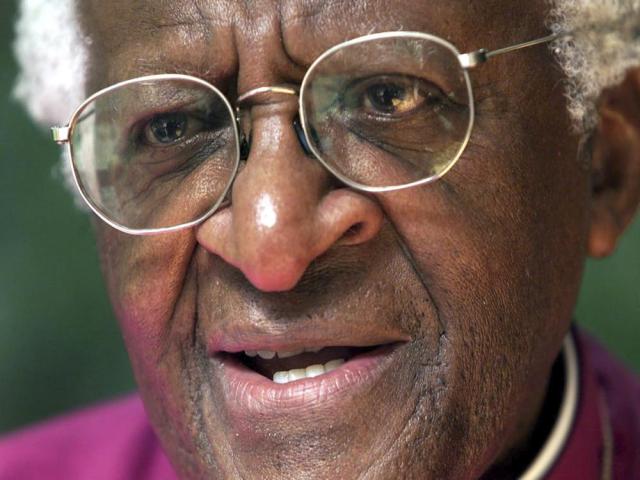Desmond Tutu, South Africa’s Nobel Peace winner, dies at 90

Desmond Tutu, South Africa’s Nobel Peace Prize-winning icon, an uncompromising foe of the country’s past racist policy of apartheid and a modern-day activist for racial justice and LGBT rights, died Sunday at 90. South Africans, world leaders and people around the globe mourned the death of the man viewed as the country’s moral conscience.
Tutu worked passionately, tirelessly and non-violently to tear down apartheid — South Africa’s brutal, decades-long regime of oppression against its Black majority that only ended in 1994.
The buoyant, blunt-spoken clergyman used his pulpit as the first Black bishop of Johannesburg and later the Anglican Archbishop of Cape Town as well as frequent public demonstrations to galvanize public opinion against racial inequity, both at home and globally.
Nicknamed “the Arch,” Tutu was diminutive, with an impish sense of humor, but became a towering figure in his nation’s history, comparable to fellow Nobel laureate Nelson Mandela, a prisoner during white rule who became South Africa’s first Black president. Tutu and Mandela shared a commitment to building a better, more equal South Africa.
Upon becoming president in 1994, Mandela appointed Tutu to be chairman of the Truth and Reconciliation Commission, which uncovered the abuses of the apartheid system.Tutu’s death on Sunday “is another chapter of bereavement in our nation’s farewell to a generation of outstanding South Africans who have bequeathed us a liberated South Africa,” South African President Cyril Ramaphosa said.
“From the pavements of resistance in South Africa to the pulpits of the world’s great cathedrals and places of worship, and the prestigious setting of the Nobel Peace Prize ceremony, the Arch distinguished himself as a non-sectarian, inclusive champion of universal human rights.”
Tutu died peacefully at the Oasis Frail Care Center in Cape Town, the Archbishop Desmond Tutu Trust said Sunday. He had been hospitalized several times since 2015 after being diagnosed with prostate cancer in 1997.
“Typically he turned his own misfortune into a teaching opportunity to raise awareness and reduce the suffering of others,” said the Tutu trust. “He wanted the world to know that he had prostate cancer, and that the sooner it is detected the better the chance of managing it.”
In recent years he and his wife, Leah, lived in a retirement community outside Cape Town.
“His legacy is moral strength, moral courage and clarity,” Anglican Archbishop of Cape Town Thabo Makgoba said in a video statement. “He felt with the people. In public and alone, he cried because he felt people’s pain. And he laughed — no, not just laughed, he cackled with delight — when he shared their joy.”
A seven-day mourning period is planned in Cape Town before Tutu’s burial, including a two-day lying in state, an ecumenical service and an Anglican requiem mass at St. George’s Cathedral in Cape Town, according to church officials. Cape Town’s landmark Table Mountain will be lit in purple, the color of the robes Tutu wore as archbishop.
British Prime Minister Boris Johnson was among the world leaders paying tribute to Tutu. “He was a critical figure in the fight against apartheid and in the struggle to create a new South Africa — and will be remembered for his spiritual leadership and irrepressible good humor.”
Throughout the 1980s — when South Africa was gripped by anti-apartheid violence and a state of emergency giving police and the military sweeping powers — Tutu was one of the most prominent Black leaders able to speak out against abuses.
A lively wit lightened Tutu’s hard-hitting messages and warmed otherwise grim protests, funerals and marches. Short, plucky, tenacious, he was a formidable force, and apartheid leaders learned not to discount his canny talent for quoting apt scriptures to harness righteous support for change.
The Nobel Peace Prize in 1984 highlighted his stature as one of the world’s most effective champions for human rights, a responsibility he took seriously for the rest of his life.
With the end of apartheid and South Africa’s first democratic elections in 1994, Tutu celebrated the country’s multi-racial society, calling it a “rainbow nation,” a phrase that captured the heady optimism of the moment.
In 1990, after 27 years in prison, Mandela spent his first night of freedom at Tutu’s residence in Cape Town. Later, Mandela called Tutu “the people’s archbishop.”
Tutu also campaigned internationally for human rights, especially LGBT rights and same-sex marriage.
“I would not worship a God who is homophobic and that is how deeply I feel about this,” he said in 2013, launching a campaign for LGBT rights in Cape Town. “I would refuse to go to a homophobic heaven. No, I would say, ‘Sorry, I would much rather go to the other place.’”
Tutu said he was “as passionate about this campaign (for LGBT rights) as I ever was about apartheid. For me, it is at the same level.” He was one of the most prominent religious leaders to advocate LGBT rights.
Tutu’s very public stance for LGBT rights put him at odds with many in South Africa and across the continent as well as within the Anglican church.
South Africa, Tutu said, was a “rainbow” nation of promise for racial reconciliation and equality, even though he grew disillusioned with the African National Congress, the anti-apartheid movement that became the ruling party in 1994 elections. His outspoken remarks long after apartheid sometimes angered partisans who accused him of being biased or out of touch.
Tutu was particularly incensed by the South African government’s refusal to grant a visa to the Dalai Lama, preventing the Tibetan spiritual leader from attending Tutu’s 80th birthday celebration as well as a planned gathering of Nobel laureates in Cape Town. South Africa rejected Tutu’s accusations that it was bowing to pressure from China, a major trading partner.

Beijing 2022: Putin tells Xi he will attend Winter Olympics
- Russian president Vladimir Putin has pledged to attend the 2022 Winter Olympics in Beijing, making him one of the first major world leaders to indicate

Selecting a Pest Control Company
- Because is such a large built-up area, it contains many conditions that pests find appealing and beneficial

will keep control of the Senate, CNN projects
- Democrats will keep their narrow Senate majority for the next two years, CNN projects, after victories in close contests in Nevada and Arizona.

Ethiopian diaspora torn by ethnic tensions in Tigray war
- Thousands of miles away from the war in Ethiopia, the ethnic cracks have started to show in an Ethiopian church in Ohio, in a lawsuit between trustees